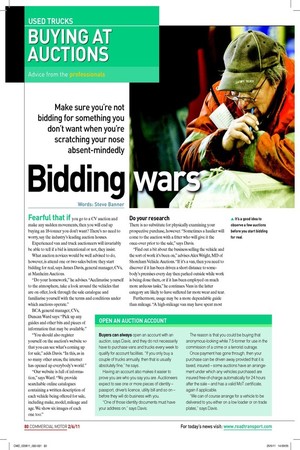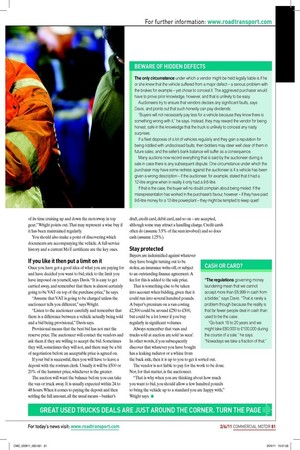Bidding
Page 43

Page 44

If you've noticed an error in this article please click here to report it so we can fix it.
Make sure you’re not bidding for something you don’t want when you’re scratching your nose absent-mindedLy
Words: Steve Banner Fearful that if you go to a CV auction and make any sudden movements, then you will end up buying an 18-tonner you don’t want? There’s no need to worry, say the industry’s leading auction houses.
Experienced van and truck auctioneers will invariably be able to tell if a bid is intentional or not, they insist.
What auction novices would be well advised to do, however, is attend one or two sales before they start bidding for real, says James Davis, general manager, CVs, at Manheim Auctions.
“Do your homework,” he advises. “Acclimatise yourself to the atmosphere, take a look around the vehicles that are on offer, look through the sale catalogue and familiarise yourself with the terms and conditions under which auctions operate.” BCA general manager, CVs, Duncan Ward says: “Pick up any guides and other bits and pieces of information that may be available.” “You should also register yourself on the auction’s website so that you can see what’s coming up for sale,” adds Davis. “In this, as in so many other areas, the internet has opened up everybody’s world.” “Our website is full of information,” says Ward. “We provide searchable online catalogues containing a written description of each vehicle being offered for sale, including make, model, mileage and age. We show six images of each one too.”
Do your research
There is no substitute for physically examining your prospective purchase, however. “Sometimes a haulier will come to the auction with a itter who will give it the once-over prior to the sale,” says Davis.
“Find out a bit about the business selling the vehicle and the sort of work it’s been on,” advises Alex Wright, MD of Shoreham Vehicle Auctions. “If it’s a van, then you need to discover if it has been driven a short distance to somebody’s premises every day then parked outside while work is being done there, or if it has been employed on much more arduous tasks,” he continues. Vans in the latter category are likely to have suffered far more wear and tear.
Furthermore, usage may be a more dependable guide than mileage. “A high-mileage van may have spent most of its time cruising up and down the motorway in top gear,” Wright points out. That may represent a wise buy if it has been maintained regularly.
You should also make a point of discovering which documents are accompanying the vehicle. A full service history and a current MoT certiicate are the key ones.
If you like it then put a limit on it
Once you have got a good idea of what you are paying for and have decided you want to bid, stick to the limit you have imposed on yourself, says Davis. “It is easy to get carried away, and remember that there is almost certainly going to be VAT on top of the purchase price,” he says.
“Assume that VAT is going to be charged unless the auctioneer tells you different,” says Wright.
“Listen to the auctioneer carefully and remember that there is a difference between a vehicle actually being sold and a bid being provisional,” Davis says.
Provisional means that the best bid has not met the reserve price. The auctioneer will contact the vendors and ask them if they are willing to accept the bid. Sometimes they will, sometimes they will not, and there may be a bit of negotiation before an acceptable price is agreed on.
If your bid is successful, then you will have to leave a deposit with the rostrum clerk. Usually it will be £500 or 20% of the hammer price, whichever is the greater.
The auction will want the balance before you can take the van or truck away. It is usually expected within 24 to 48 hours. When it comes to paying the deposit and then settling the full amount, all the usual means – banker’s draft, credit card, debit card, and so on – are accepted, although some may attract a handling charge. Credit cards often do (assume 3.5% of the sum involved) and so does cash (assume 1.25%).
Stay protected
Buyers are indemniied against whatever they have bought turning out to be stolen, an insurance write-off, or subject to an outstanding inance agreement. A fee for this is added to the sale price.
That is something else to be taken into account when bidding, given that it could run into several hundred pounds. A buyer’s premium on a van costing £2,500 could be around £250 to £300, but could be a lot lower if you buy regularly in signiicant volumes.
Always remember that vans and trucks sold at auction are sold ‘as seen’ . In other words, if you subsequently discover that whatever you have bought has a leaking radiator or a whine from the back axle, then it is up to you to get it sorted out.
The vendor is not liable to pay for the work to be done. Nor, for that matter, is the auctioneer.
“That is why when you are thinking about how much you want to bid, you should allow a few hundred pounds to bring the vehicle up to a standard you are happy with,” Wright says. ■














































